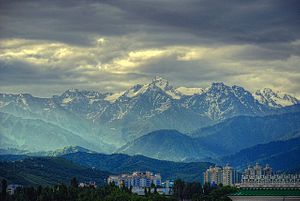Debate and discussion can be a healthy thing. This is especially true when it comes to the issue of extremism and radicalization in Central Asia, a region undercovered by major media outlets and difficult to access even by the researchers devoted to it. It is for that reason that a recent article published in The Diplomat that focuses on my reporting from Central Asia is a welcome attempt at contributing to this conversation and shedding light on a complex and nuanced topic.
The article, however, contains several statements that mischaracterize the nature of my reporting and some that are simply incorrect. Furthermore, it is important to note that despite alleging that my dispatch is based on “thin evidence,” the authors do not challenge any of the original reporting — the product of weeks on the ground research and reporting in Kazakhstan — conducted for the article.
Before continuing, it is important to set the record straight.
The first of such statements is that my reporting is uncritical of the authorities’ claims about extremism, pointing to a quote that informed the headline of my reported dispatch that the authors portray as peddling the Kazakh authorities’ line. “In other words, the authorities’ claims that violent extremism is a major problem and is indeed growing are taken at face value,” write the authors.
This is false. The quote derives from an interview with a lawyer who focuses on extremism cases. Not only is the quoted lawyer not affiliated with the state, she is a well-known critic of the government and the abuses that have been carried out by the state in the name of countering extremism. To say that the report uncritically peddles the authorities’ claims is to ignore the multitude of voices from various backgrounds that informed the article.
Next, the authors make several misleading statements related to the attack that took place in Almaty in July 2016. The first is that Ruslan Kulekbayev, the Almaty gunman, may not have been an extremist because he spent the night with a prostitute the night before the attack. The authors ask: “How can one reconcile the radical Islam allegation with reports that the Almaty shooter spent the night before the attack with a prostitute?” Exactly how this discounts what Kulekbayev did the next day is never explained by the authors.
Furthermore, it fails to acknowledge the wealth of research and examples of other attacks carried out in the name of extremist ideology by individuals with backgrounds that did not fully match up to those beliefs. For example, the Abdeslam brothers behind the 2015 Paris attacks, were known drug users and regular visitors of a gay night club, even as recently as a month before the attacks. Similarly, the spiritual founder of the Islamic State, Abu Musab al-Zarqawi, was a violent criminal both before and after his embrace of jihadism.
Radicalization is a complex topic and its causes are the source of much scholarly debate. But Kulekbayev’s actions and background are hardly evidence that he isn’t an Islamist extremist.
The second misleading statement is that the Kazakh authorities denied that Kulekbayev was radicalized in prison. In the article that the authors link to in support of this claim, the prison service does not deny that Kulekbayev was radicalized in prison. Rather, the linked article quotes Meriam Ayubayev, the deputy chairman of the committee of the criminal executive system of the Ministry of Internal Affairs, saying that they have been aware of the problem of radicalization in prisons since the 1990s and now have a comprehensive program in place to tackle it. Ayubayev defends the government program by saying that he does not believe that people can be radicalized in prison now. The authors also omit a previous statement by the head of Kazakhstan’s National Security Service where they say that Kulekbayev was radicalized in prison.
Moreover, the authors link to a tweet to assert that the Interior Ministry believes Kulekbayev is only a petty criminal. The full version of the minister’s comments, which is not linked by the authors, does mention Kulekbayev’s criminal past, but goes on to state that he did in fact meet “Salafis” while in prison.
The authors then aim to question the value of research conducted by the Soufan Group and the International Crisis Group on the number of foreign fighters from Central Asia that have joined extremist groups in Iraq and Syria. The article in says that “two scholars, John Heathershaw and David W. Montgomery, found these numbers to be ‘no more than guesswork.'” Indeed, figures from both organizations are estimates and they are presented that way in my article. But they are informed estimates based off extensive research. And while I have no affiliation with the Soufan Group or the International Crisis Group, they each have strong reputations for diligence and accuracy. It is also worth noting that John Heathershaw, whom the authors mention as having allegedly debunked the estimates, has found the International Crisis Group’s work on Central Asian foreign fighters reliable enough to use in his own research on the topic.
This series of missteps by the authors is unfortunate because it distracts and discounts the local voices that informed my report from Kazakhstan. All those quoted in the article are from Kazakhstan either work on the front lines dealing with extremism and radicalization in their respective fields or have been directly affected by it. Why their experiences, analyses, and conclusions should be dismissed is never explained by the authors.
Finally, it is necessary to say that I am not an analyst, academic, or policymaker. I am a journalist. The main part of my job as a journalist is to gather information on the ground and report on events as a professional.
Reflexive dismissals do absolutely nothing to improve our understanding of a complicated and changing phenomenon.
Reid Standish a journalist based in Helsinki, Finland. He was formerly associate editor at Foreign Policy magazine in Washington, D.C.































